Amaru was a Sanskrit poet who probably wrote around the ninth century. Although virtually nothing is known about his life, his
is one of the most admired collections of love lyrics in the Sanskrit language. Amarus poetic style has been appreciated through the centuries for conveying so much sentiment in a single stanza that each appears like a whole poem. Aditya Narayan Dhairyasheel Haksar is a well-known translator of Sanskrit classics. A long-time career diplomat, he served as the Indian high commissioner in Kenya and the Seychelles, as a minister in the United States and as an ambassador in Portugal and Yugoslavia.
Introduction
The Sanskrit term
shatakam indicates quantity, of about a hundred.
Amaru Shatakam, with its that many colourful love lyrics, is one of the best known and highly regarded such works from the world of Sanskrit literature. This reputation has now existed in that literatures own record since over a thousand years. It has also been recognized in the Western world during the last century. 850 AD ). 850 AD ).
In his words as translated, Amaru proves that a poet can, in a single stanza, convey so much sentiment that each appears like a whole poem. The oldest existing recension of Amaru Shatakam The contents of each also vary slightly. But all of them, together with individual verses found in various old anthologies, indicate a continuing Indian interest in Amarus poetry, stretching over a long time and from many different parts of the country. A picturesque example of this interest is found in legends that link Amaru with the great Indian philosopher and seer Adi Shankara (c.788820 AD ). That story first appeared in his fourteenth century biography Shankara Digvijaya by Madhava Vidyaranya, one of his many followers. Broadly, it is as follows.
As is well known, the sage Shankara travelled all over the country, to propagate and discuss his thoughts. At a discussion in Kashmir he was questioned about erotic matters with which, as a celibate, he was unfamiliar. In order to understand them, using his yogic powers he entered and temporarily brought back to life the just deceased body of the local king Amaru, and visited his harem several times. Thereafter he composed for future record the verses still known by that kings name. This tale was retold with other embellishments, including in a later Amaru recension, whose editor also considered that the verses had dual meanings, both physical and mystic. But the story has been rejected by modern scholarship over the last century.
Also, there is no trace of any king Amaru in the history of Kashmir. But the work Amaru Shatakam itself has always been praised. In present times, this has continued with many famous western scholars. In the words of the respected late Sanskritist A.B. Keith, it is essentially a collection of pictures of love... gay, high-spirited, delighting in tiny tiffs and lovers quarrels, but ending in smiles.
The stanzas also show the elegance and precision of Amarus style, and his avoidance of long and difficult compounds. Half a century later, another equally respected scholar, A.K. Warder, devoted a whole chapter to Amaru in his multi-volume history of Indian kavya literature. In his words, the all-pervading spirit of the Hundred is that of tenderness. There is none of the scepticism or cynicism about love... making the work almost unique. making the work almost unique.
This appreciation by the western world has continued in recent times. A full translation of Amaru Shatakam by Andrew Schelling appeared in Boston as recently as 2004. For our times, Schelling says, it shows that long years ago India developed love poetry, original and vivid as that anywhere on the planet. with a roman transcription, both of which have been used for rechecking the present translation. As far as I know, the last complete and learned translation of Amaru in India, was done by the Sanskrit scholar C.R. Devdhar, about a century ago, and then reprinted in 2014.
The time thus seemed ripe to present this new translation in contemporary language for the reader of today, especially in our country where the original was once well known and commented on by famous critics of the time. While translating it, I also formed some impressions about this celebrated poetic work that I am now glad to present here. These are ancient lyrics, but they give vivid glimpses of the mutual attraction of men and women in quite a modern manner. The love they picture has physical, emotional as well as social aspects. It is delightful but also painful, and felt by women as much as men. Each verse portrays a different aspect, in simple and direct language.
In some cases, there is a continuity of thought in successive verses. In others, the scenes and settings revolve around basic themes, such as union and separation, delight and anger, success and failure. For ease of reading, the presentation here has been divided into seven cantos, each with some shift in its focus. But the overall spirit, that the totality of these verses conveys, appears relevant for all times and places. This translation is based on the Arjuna Varma Deva recension already mentioned. It has been counter-checked, as also mentioned, with the literal rendition prepared by Greg Baily.
In my translation, I have also endeavoured to convey both the spirit and the flavour of the original verses, with the hope that this will give a deeper understanding of our lesser-known Sanskrit poetry to readers of today. I am grateful to Penguin Random House India and its then editor Ambar Chatterjee for their agreement to my undertaking this translation. My gratitude also to the new editor Ananya Bhatia, and to Tarini Uppal, for their arrangement of this works editing and publication. Finally, heartfelt thanks to my wife, Priti, for reading and commenting on several drafts, and to our son, Vikram, for his pertinent suggestions on those that he saw. This has been a work of love, and is now dedicated to my beloved life-companion in this year of our diamond jubilee. A.N.D.H.
New Delhi January 2021
My Shameless Heart
Love Lyrics of Amaru Shatakam
Benediction
While a bee hovers greedily near the blossom cluster on her ear, may the glance of Ambika, and the glow on her finger nails, as her hand the bow-string draws in the manner of an archer may all this protect you.(1) May the flames of Shambhus arrows burn away your sins entire, like a new lovers misdeed, when, forcefully grasping the skirt of a maiden from the triple city, he holds her hair while bowing down, that, with her tear-filled lotus eyes, she does not notice in agitation, while rejecting his embrace.(2) May the face of a slender girl, hair dishevelled, earrings trembling, her

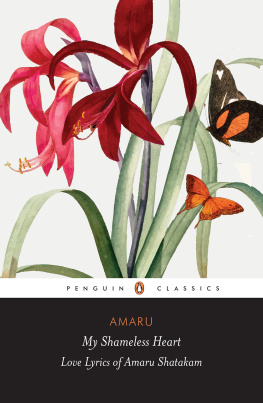

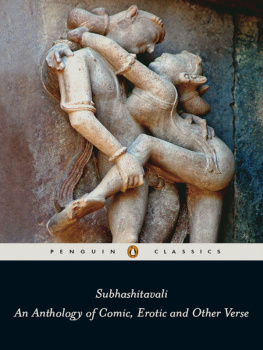
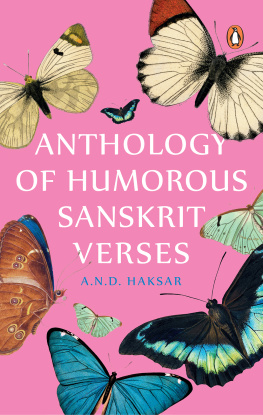



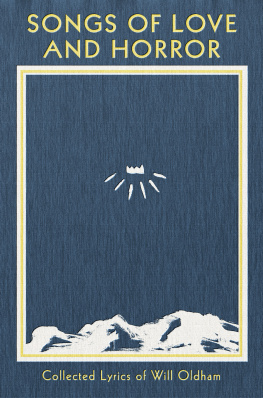


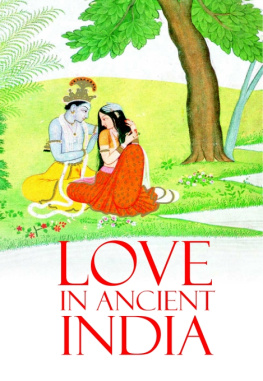

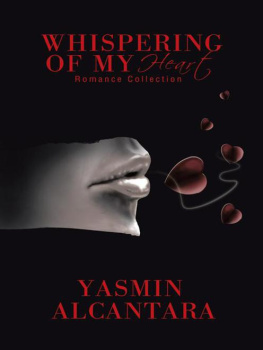
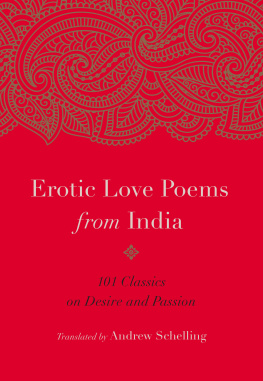
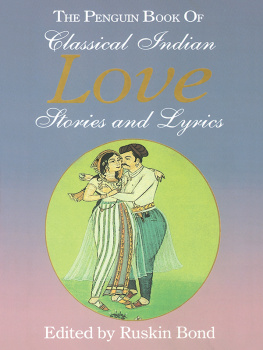





 CLASSICS
CLASSICS 